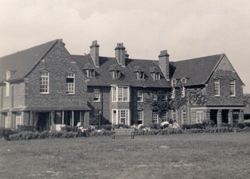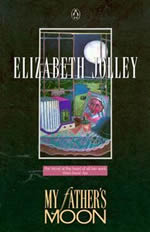

St Martin's Hospital in 1940 where Elizabeth
Jolley served as a probationary nurse.
... a nurse "should be unable to make a mistake"...
Pyrford
In her final term at Sibford, Jolley discussed becoming a nurse with her father who assured her it was a worthy aspiration because nurses did God's work. She did not discuss the matter with her mother who disliked nurses for being hard-hearted and thought they were "common" as well. She was accepted to train for orthopaedic nursing at St Nicholas and St Martin's Hospitals in Pyrford but was completely unprepared for what she encountered when she and Peggy Yeoman, also from Sibford, arrived on 31 August 1940: she was given a cup of tea and a uniform and sent off to work on the big boys' ward. The next morning, after the overnight German bombing of the nearby Vickers airplane factory, she suddenly found herself in the role of a trauma nurse despite never had any nurse training. Later she said the experience was so daunting that she would have left straight away, if only she knew how.
Pyrford was different from Sibford in other ways as well. She was treated as an adult who had to look out for herself since the nurses seemed to have no particular concern for her. She regarded them as "battleaxes," although she came to realise that not all of them felt that way, later writing, "when you are young you don't understand the kindness that's being shown to you and the care . . . that's being taken of you." The situation was aggravated by the fact that, unlike in her experience at Sibford, trainees were expected to learn without questioning, to act without thinking. As the Preface to Evelyn Pearce's General Textbook of Nursing said, a nurse "should be unable to make a mistake" ("Little Herb" p. 49).
Nurses worked 7 am-9 pm with three hours off, six days per week, as a result of which, Jolley said, opportunities for boyfriends were "absolutely hopeless." Some of the patients were engaged or married and, in any case, most of them were bedridden, some with quite serious conditions and/or limited prospects, some having been hospitalised long before Jolley arrived, remaining there long after she left.
From the patient's point of view, however, it could seem that a man's prospects for a girlfriend were more promising. For example, there was a nine-year-older Quaker man admitted the June before Jolley arrived who held degrees from University College London and who, despite being engaged, was a serial flirt with the nurses. He was a pacifist whom, for that reason, another patient thought should be taken out and shot. But Jolley enjoyed talking with him about ethics and religion (both of their fathers being ministers, his a conservative London City Missionary) and listening to classical music with him on the portable gramophone he had borrowed from the chaplain. His 11 February 1941 diary entry described her as "the only person on the ward who understands me in the least" - but he thought that of all the girls. For her part, Jolley mentioned him in her letters home, but nothing came of it by the time he was discharged in October 1941.
Obviously opportunities would have existed for romance between nurses, something Vera (as in Veronica [and thereby Monica?]) imagines in My Father's Moon. When she is transferred to a new ward and finds her sleep disturbed by noisy goings-on in the bathroom adjacent to her room, she peers through a hole in the wall and sees the tipsy X-ray nurses Snorter and Diamond dancing naked, bodies touching, and then bathing together. Vera says, "The little dance, the bathroom dance, gives me an entirely new outlook" (p. 58).
While at Pyrford Jolley wrote a short story which, she said, resulted
from homesickness although, interestingly, its title "Lehman Sieber"
is an amalgam of the names of two girls she met at the leadership camp
she attended in Hamburg (Ingeborg Lehmann and Ilse Siebert). Set in the
idyllic countryside near Dresden, the family is structured like the Knight
household (husband and wife with two young daughters) except for the fact
of a son who drives his sister/horse about the house with a whip. Two
things stand out in the three-page story: one is the potential violence
in the exuberant son's childhood game, and the other is the ambivalence
displayed toward her mother - after the young woman tells the family that
her sister and mother are moving from Magdeburg (Marie Kemmeter's home)
to somewhere "nearer," we are told that "She almost
got up and danced around the kitchen" (emphasis added).

My Father's Moon, Penguin, 1989